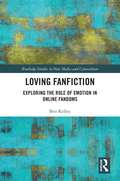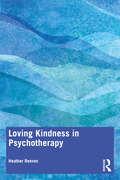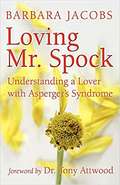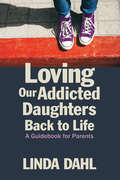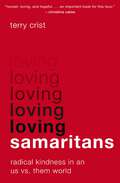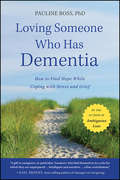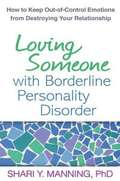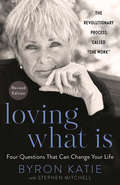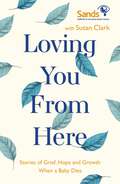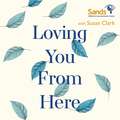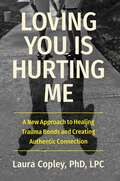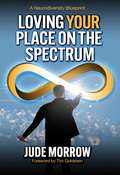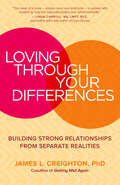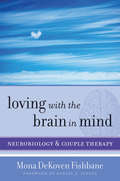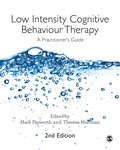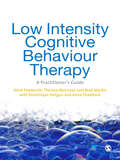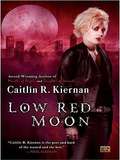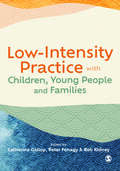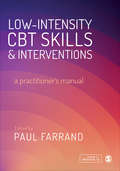- Table View
- List View
Lovey: A Very Special Child
by Mary MaccrackenHanna was more animal than child, and no one else wanted her in their classroom. Even in the school for emotionally disturbed children where Mary MacCracken taught, Hannah was considered a hopeless case. Could Mary reach her?
Loving Fanfiction: Exploring the Role of Emotion in Online Fandoms (Routledge Studies in New Media and Cyberculture)
by Brit KelleyLoving Fanfiction explores emotion within the context of fandoms, specifically online fanfiction. Through exploring fans’ narratives about themselves and the fanwork they produce and consume, the author theorizes how identity, cognition, emotion, the body, and embodiment come together in literacy development and practices. Drawing on affect theory to explore the complex roles of emotions, literacy, identity, and the digital, both in their own position and in the worlds of engaged fans, Brit Kelley systematically analyses work from a six-year ethnographic study across fandoms—from Harry Potter and WWE, to Gotham and Twilight. Their analysis expands upon current understandings of fandom by more thoroughly theorizing the deeply emotional element of fanfiction practices, and connects to the academic fan community to draw connections and implications for the role of emotion in teaching and research. This unique perspective on emotions, love, and fandoms will be of significant interest to scholars and students of media and communication studies, fan studies, literature, creative writing, cultural studies, digital humanities, and literacy studies.
Loving Kindness in Psychotherapy
by Heather ReevesThis book explores the way in which loving kindness, contained within professional boundaries of practice, is essential to the building of trust necessary to the psychotherapy relationship. Arguing that loving kindness has both biological and ethical relevance in assisting recovery from the trauma of emotional injury, Heather Reeves brings forth a renewed philosophical and cultural discourse about its importance in professional work with vulnerable people. The philosophical premise of the book is the concept of alterity, or awareness of the subjective reality of others, developed by Emmanuel Levinas and expressed in psychotherapy theories since the mid-twentieth century. Understandings drawn from attachment theory, affective neuroscience and psychodynamic psychotherapy are applied to case studies (one of them written by a client) from the author’s practice and themes from literature and biography, including the long-term impact of the Covid pandemic. Loving Kindness in Psychotherapy will appeal to psychotherapists, counsellors and other mental health professionals as well as a range of other readers, including medical and palliative care professionals, educators, clergy, theologians and philosophers.
Loving Mr. Spock: Understanding a Lover with Asperger's Syndrome
by Tony Attwood Barbara JacobsAs a popular advice columnist in the UK, Barbara Jacobs never suspected she’d be the one needing the relationship advice. But when she fell in love with Danny, a man with Asperger’s Syndrome, she quickly learned to expect the unexpected. In this book, Barbara candidly delves into the dynamics of their relationship. She lovingly compares Danny to Mr. Spock, a character who thrives on logic rather than emotion, while admitting that she was quite opposite. Join Barbara and Danny on their tumultuous journey in love, and learn about Asperger’s along the way through figures, diagnostic guidelines, quotes and surveys by other couples, and more. If you love someone with Asperger’s, or have Asperger’s yourself, you can learn a lot from this book. Note: This book addresses some mature topics.
Loving Our Addicted Daughters Back to Life
by Linda DahlThe latest information on gender-specific treatment of addiction and recovery can be found in this go-to manual for parents seeking direction to help their daughters. Step-by-step guidelines present tools for recognizing substance abuse in young women; communicating with them and their care providers; dealing with relapse and long-term recovery; and managing parental shame, guilt, fear, anger, and loving detachment.Linda Dahl is the author of six books, including Morning Glory (2012), chosen as a New York Times Notable Book of the Year. A mother of two, she currently resides in New York.
Loving Psychoanalysis: Looking at Culture with Freud and Lacan
by Ruth GolanPsychoanalysis was neither a product of philosophy nor of academic study. Rather, psychoanalysis was born in the clinic. Freud took his lead from hysterical women; the accounts of their pain, anxieties and physical symptoms led him to formulate his theories on the existence of the unconscious.
Loving Samaritans: Radical Kindness in an Us vs. Them World
by Terry CristYou can live a radically inclusive life without compromising your beliefs or the truth of the gospel.Humanity is more divided now than ever, gridlocked over social issues, race, gender, climate change, immigration, and our responsibility to vulnerable people. How did we get here? And what can we do to build bridges where walls exist?As a pastor committed to building deep relationships with people whose life experiences are different than his own, Terry Crist knows the beauty and challenge of connecting across dividing lines of race, economic status, faith, and much more. And in this book, he shares how you can too.Profoundly weaving the story of Jesus and the Samaritan woman at the well with his own stories and examples from culture today, Terry addresses how we've strayed from the unity God intended and how we can trade judgment for grace, disputes for harmony, apathy for empathy, and hate for love and acceptance. By the end of this book, you will be able to:Identify how you personally see the world and why it mattersRecognize those on the margins who are right around youImitate Jesus's love for all humanity in the interactions you have with othersExtend dignity to those suffering from mental illness, homelessness, and addictionMaintain thriving relationships when family members are on opposing sides of issuesBe an ambassador of reconciliation in your community It doesn't have to be one or the other--you can both love God and love your neighbor.
Loving Someone Who Has Dementia: How to Find Hope while Coping with Stress and Grief
by Pauline BossResearch-based advice for people who care for someone with dementia Nearly half of U.S. citizens over the age of 85 are suffering from some kind of dementia and require care. Loving Someone Who Has Dementia is a new kind of caregiving book. It's not about the usual techniques, but about how to manage on-going stress and grief. The book is for caregivers, family members, friends, neighbors as well as educators and professionals—anyone touched by the epidemic of dementia. Dr. Boss helps caregivers find hope in "ambiguous loss"—having a loved one both here and not here, physically present but psychologically absent. Outlines seven guidelines to stay resilient while caring for someone who has dementia Discusses the meaning of relationships with individuals who are cognitively impaired and no longer as they used to be Offers approaches to understand and cope with the emotional strain of care-giving Boss's book builds on research and clinical experience, yet the material is presented as a conversation. She shows you a way to embrace rather than resist the ambiguity in your relationship with someone who has dementia.
Loving Someone with Borderline Personality Disorder
by Shari ManningPeople with borderline personality disorder (BPD) can be intensely caring, warm, smart, and funny but their behavior often drives away those closest to them. If you're struggling in a tumultuous relationship with someone with BPD, this is the book for you. Dr. Shari Manning helps you understand why your spouse, family member, or friend has such out-of-control emotions and how to change the way you can respond. Learn to use simple yet powerful strategies that can defuse crises, establish better boundaries, and radically transform your relationship. Empathic, hopeful, and science based, this is the first book for family and friends grounded in dialectical behavior therapy (DBT), the most effective treatment for BPD.
Loving Someone with Borderline Personality Disorder: How to Keep Out-of-Control Emotions from Destroying Your Relationship
by Marsha M. Linehan Shari Y. ManningPeople with borderline personality disorder (BPD) can be intensely caring, warm, smart, and funny-but their behavior often drives away those closest to them. If you're struggling in a tumultuous relationship with someone with BPD, this is the book for you. Dr. Shari Manning helps you understand why your spouse, family member, or friend has such out-of-control emotions-and how to change the way you can respond. Learn to use simple yet powerful strategies that can defuse crises, establish better boundaries, and radically transform your relationship. Empathic, hopeful, and science based, this is the first book for family and friends grounded in dialectical behavior therapy (DBT), the most effective treatment for BPD.
Loving What Is, Revised Edition: Four Questions That Can Change Your Life
by Stephen Mitchell Byron KatieDiscover the truth hiding behind troubling thoughts with Byron Katie&’s self-help classic.In 2003, Byron Katie first introduced the world to The Work with the publication of Loving What Is. Nearly twenty years later, Loving What Is continues to inspire people all over the world to do The Work; to listen to the answers they find inside themselves;and to open their minds to profound, spacious, and life-transforming insights. The Work is simply four questions that, when applied to a specific problem, enable you to see what is troubling you in an entirely different light.Loving What Is shows you step by step, through clear and vivid examples, exactly how to use this revolutionary process for yourself. In this revised edition, readers will enjoy seven new dialogues, or real examples of Katie doing The Work with people to discover the root cause of their suffering. You will observe people work their way through a broad range of human problems, learning freedom through the very thoughts that had caused their suffering—thoughts such as &“my husband betrayed me&” or &“my mother doesn&’t love me enough.&”If you continue to do The Work, you may discover that the questioning flows into every aspect of your life, effortlessly undoing the stressful thoughts that keep you from experiencing peace. Loving What Is offers everything you need to learn and live this remarkable process, and to find happiness as what Katie calls &“a lover of reality.&”
Loving You From Here: Stories of Grief, Hope and Growth When a Baby Dies
by Susan ClarkFew experiences can compare to the trauma and pain of losing a baby; and the wall of silence that often surrounds that loss can make grieving even harder. Loving You From Here explores the traumatic impact of losing a baby through stillbirth and neonatal death. It features the moving stories of multiple families; some affected recently, some decades ago, but still living with the loss. This book is a practical guide for grieving parents in the grips of tragedy, and those around them who want to be able to offer support. From managing those initial feelings of shock, grief, guilt and anger, this book will also show families how it is possible to grow around that grief and eventually form an enduring bond with their baby.This profound and insightful book will help everyone impacted by the loss of a baby - before, during or after birth - including those who have suffered an early or a late miscarriage and those who have had an ectopic pregnancy, and provides sensitive and reassuring advice on all aspects of loss and bereavement, as well as practical advice on how to find a new normal.This groundbreaking book breaks through the suffocating silence that surrounds the death of a baby and gives a voice to all those affected by baby loss.
Loving You From Here: Stories of Grief, Hope and Growth When a Baby Dies
by Susan ClarkFew experiences can compare to the trauma and pain of losing a baby; and the wall of silence that often surrounds that loss can make grieving even harder.Loving You From Here explores the traumatic impact of losing a baby through stillbirth and neonatal death. It features the moving stories of multiple families; some affected recently, some decades ago, but still living with the loss. This book is a practical guide for grieving parents in the grips of tragedy, and those around them who want to be able to offer support. From managing those initial feelings of shock, grief, guilt and anger, this book will also show families how it is possible to grow around that grief and eventually form an enduring bond with their baby.This profound and insightful book will help everyone impacted by the loss of a baby - before, during or after birth - including those who have suffered an early or a late miscarriage and those who have had an ectopic pregnancy, and provides sensitive and reassuring advice on all aspects of loss and bereavement, as well as practical advice on how to find a new normal.This groundbreaking book breaks through the suffocating silence that surrounds the death of a baby and gives a voice to all those affected by baby loss.(P) 2020 Hodder & Stoughton Ltd
Loving You Is Hurting Me: A New Approach to Healing Trauma Bonds and Creating Authentic Connection
by Laura CopleyMove forward in your journey and learn how to heal your emotional wounds, get unstuck, and get into healthy, loving, intimate relationships with the help of this eye-opening book. At the core of most toxic relationships is a painful trauma wound desperate to be healed. As a licensed professional counselor and trauma researcher, Dr. Laura Copley often found herself disturbed by the stigma that her profession puts on trauma survivors who are in these toxic bonds, often too quickly labeling them as victims or abusers and blaming them for their troubled relationships. But trauma survivors try to navigate romantic relationships in the only way they know how--fearfully and painfully. Too often, survivors of trauma are left feeling hopeless, exiled from normal social interactions, and destined for heartbreak in any relationship they attract. Through her work with clients, and her own experiences, Dr. Copley developed a roadmap for healing the toxic emotions that come from being bonded by trauma in relationships. In Loving You is Hurting Me, Dr. Copley guides you through your trauma origins and into a life rich with meaning, loving connection, and inspiration. Drawing from groundbreaking science on trauma and its effects on the body, and from her own practice including a decade&’s worth of research on trauma and intimacy, Dr. Copley presents an experiential and transformative approach unlike any other. Her program transforms your trauma bond into deep connection with the self and safe intimacy with others.
Loving Your Place on the Spectrum: A Neurodiversity Blueprint
by Jude MorrowLoving Your Place on the Spectrum: A Neurodiversity Blueprint provides answers to many of your questions about autism, helping you to embrace neurodiversity and love your autistic self and the autistic people in your life. Jude Morrow speaks from personal experience when he says that he has learned to be proud to be autistic and he wants you to be proud too.Browse through the many books available on autism and you might notice a trend: too many of them are written by neurotypical professionals who aim to &“fix&” autism or help autistic people appear &“normal.&” Jude Morrow noticed this problem and decided that something needed to change. Loving Your Place on the Spectrum is a guide for living a happy and successful autistic life. Jude combines his own experiences as an autistic man with the stories of others to provide a handbook to help autistic individuals navigate life&’s major changes, from childhood to college, jobs, and relationships. Each chapter identifies common issues faced by autistic people of a particular age or social group and explains how educators, teachers, parents, and professionals can be supportive through all these life stages. The world needs a new perspective on autism, and Jude Morrow&’s Loving Your Place on the Spectrum provides parents, workplaces, individuals, and society an alternative, strengths-based viewpoint, where autistic people are accepted, embraced, and loved.
Loving through Your Differences: Building Strong Relationships from Separate Realities
by James L. CreightonFIND HAPPINESS AND FULFILLMENT THROUGH — RATHER THAN DESPITE — YOUR DIFFERENCES Dr. James Creighton has worked with couples for decades, facilitating communication and conflict resolution and teaching them the tools to build healthy, happy relationships. He has found that many couples start out believing they like the same things, see people the same way, and share a united take on the world. But inevitably differences crop up, and it can be profoundly discouraging to find that one’s partner sees a person, situation, or decision completely differently. Although many relationships flounder at this point, Creighton shows that this can actually be an opportunity to forge stronger ties. In Loving through Your Differences, he draws on the latest research in cognitive science and developmental psychology to show how we invent our realities with our perceptual minds. He then provides clear, concrete tools for shifting our perceptions and reframing our responses. The result moves couples out of the fear and alienation of “your way or my way” and into a deep understanding of the other that allows for an “our way.” As Creighton shows, this way of being together, based on the reality of individuality rather than the illusion of sameness, sets the stage for long-term excitement, discovery, and fulfillment.
Loving with the Brain in Mind: Neurobiology and Couple Therapy (Norton Series on Interpersonal Neurobiology)
by Daniel J. Siegel Mona Dekoven FishbaneFacilitating change in couple therapy by understanding how the brain works to maintain--and break--old habits. Human brains and behavior are shaped by genetic predispositions and early experience. But we are not doomed by our genes or our past. Neuroscientific discoveries of the last decade have provided an optimistic and revolutionary view of adult brain function: People can change. This revelation about neuroplasticity offers hope to therapists and to couples seeking to improve their relationship. Loving With the Brain in Mind explores ways to help couples become proactive in revitalizing their relationship. It offers an in-depth understanding of the heartbreaking dynamics in unhappy couples and the healthy dynamics of couples who are flourishing. Sharing her extensive clinical experience and an integrative perspective informed by neuroscience and relationship science, Mona Fishbane gives us insight into the neurobiology underlying couples' dances of reactivity. Readers will learn how partners become reactive and emotionally dysregulated with each other, and what is going on in their brains when they do. Clear and compelling discussions are included of the neurobiology of empathy and how empathy and selfregulation can be learned. Understanding neurobiology, explains Fishbane, can transform your clinical practice with couples and help you hone effective therapeutic interventions. This book aims to empower therapists-- and the couples they treat--as they work to change interpersonal dynamics that drive them apart. Understanding how the brain works can inform the therapist's theory of relationships, development, and change. And therapists can offer clients "neuroeducation" about their own reactivity and relationship distress and their potential for personal and relational growth. A gifted clinician and a particularly talented neuroscience writer, Dr. Fishbane presents complex material in an understandable and engaging manner. By anchoring her work in clinical cases, she never loses sight of the people behind the science.
Low Intensity Cognitive Behaviour Therapy: A Practitioner's Guide
by Theresa Marrinan Dr Mark PapworthThis is the essential book for any health professionals whose role incorporates low intensity CBT. It introduces readers to the principles and skills of cognitive behaviour therapy, and guides them through the entire process of working with adult patients with common mental health problems. Beginning at the initial assessment, it takes students through the implementation of interventions to the management of ending. Detailed case studies illustrate each step of patients' recovery journeys. This new edition: is updated in line with changes in the PWP curriculum and broader IAPT policies includes new chapters on working with older adults and patients with long-term conditions adds new exercises to help readers reflect on their own practice, and builds confidence to help them become outstanding practitioners.
Low Intensity Cognitive Behaviour Therapy: A Practitioner's Guide
by Theresa Marrinan Dr Mark PapworthThis is the essential book for any health professionals whose role incorporates low intensity CBT. It introduces readers to the principles and skills of cognitive behaviour therapy, and guides them through the entire process of working with adult patients with common mental health problems. Beginning at the initial assessment, it takes students through the implementation of interventions to the management of ending. Detailed case studies illustrate each step of patients' recovery journeys. This new edition: is updated in line with changes in the PWP curriculum and broader IAPT policies includes new chapters on working with older adults and patients with long-term conditions adds new exercises to help readers reflect on their own practice, and builds confidence to help them become outstanding practitioners.
Low Intensity Cognitive-Behaviour Therapy: A Practitioner's Guide
by Brad Martin Anna Chaddock Dominique Keegan Theresa Marrinan Dr Mark Papworth'An engaging textbook which explores 'low intensity interventions' and modes of delivery whilst placing equal emphasis on the therapeutic value of the relationship between service user and practitioner' - Jane Briddon, APIMH Primary Mental Health Care MSC, University of Manchester This is a practical and jargon-free introduction to the principles, skills and application of Low Intensity Cognitive Behaviour Therapy (LICBT). Tailored specifically for the low intensity practitioner, it shows you how to deliver the approach to service users presenting with common adult mental health problems such as anxiety or depression, and how to use therapy 'vehicles' like supported self-help. Beginning at the initial assessment, the book will guide you all the way through the implementation of interventions to the management of endings - with key case examples threading through the book to illustrate each step. Interactive exercises will encourage your self-development, leaving you with a deeper understanding of the approach. This accessible, evidence-based book is essential reading for Psychological Wellbeing Practitioners (PWPs). It will also be useful for health professionals of all kinds who need a practical guide to applying this cost-effective therapy in clinical settings. Mark Papworth is consultant clinical psychologist at Newcastle University. Theresa Marrinan is clinical/academic tutor at Newcastle University. Brad Martin is a consultant clinical psychologist and cognitive therapist in Wellington, New Zealand. Dominique Keegan is a clinical psychologist and cognitive therapist, working in the NHS and as a clinical lecturer on the PGDipCBT at Newcastle University. Anna Chaddock is a clinical psychologist and CBT therapist in Newcastle upon Tyne Hospitals NHS Foundation Trust.
Low Red Moon
by Caitlin R. KiernanSeveral years after the events in Threshold, Chance and Deacon have married. They're looking ahead to the future, trying to put the past behind them. But new nightmares await them as a woman with a need for violence enters their lives. And something even worse has followed her...
Low-Intensity Practice with Children, Young People and Families
by Peter Fonagy Catherine Gallop Rob KidneyThis is the essential "how to guide" for low-intensity mental health trainees, practitioners and service supervisors who support children and young people with mild-moderate anxiety, depression and behavioural difficulties. It provides a manual for practice covering assessment, decision-making and key interventions, with step-by-step guidance, case vignettes and accompanying worksheets to support each evidence-based intervention. It also offers guidance on key service implementation principles, supervision and adaptations to practice. It is an ideal resource for those in low-intensity training, practitioner or leadership roles, looking to develop competency in the low-intensity cognitive behavioural clinical method.
Low-Intensity Practice with Children, Young People and Families
by Peter Fonagy Catherine Gallop Rob KidneyThis is the essential "how to guide" for low-intensity mental health trainees, practitioners and service supervisors who support children and young people with mild-moderate anxiety, depression and behavioural difficulties. It provides a manual for practice covering assessment, decision-making and key interventions, with step-by-step guidance, case vignettes and accompanying worksheets to support each evidence-based intervention. It also offers guidance on key service implementation principles, supervision and adaptations to practice. It is an ideal resource for those in low-intensity training, practitioner or leadership roles, looking to develop competency in the low-intensity cognitive behavioural clinical method.
Low-intensity CBT Skills and Interventions: a practitioner′s manual
by Paul FarrandThis book takes you step-by-step through the Low-intensity CBT interventions and clinical procedures. With an Online Resource site of accompanying workbooks and worksheets, it provides a comprehensive manual for trainee and qualified Psychological Wellbeing Practitioners.
Low-intensity CBT Skills and Interventions: a practitioner′s manual
by Paul FarrandThis book takes you step-by-step through the Low-intensity CBT interventions and clinical procedures. With an Online Resource site of accompanying workbooks and worksheets, it provides a comprehensive manual for trainee and qualified Psychological Wellbeing Practitioners.

